Can Weight Loss Cure Sleep Apnea? Discover the Transformative Truth!
Can weight loss cure sleep apnea? Sleep apnea is a condition that affects breathing during sleep. It can cause loud snoring and tiredness during the day. One common type is obstructive sleep apnea. This happens when the throat muscles relax too much, blocking the airway. Many people wonder if losing weight can help cure sleep apnea. Carrying excess weight might contribute to this problem. So, does sleep apnea go away with weight loss? Let’s explore how body weight affects sleep apnea and see if shedding pounds can be part of the treatment.
How Sleep Apnea Affects Health
![]()
Sleep apnea is more than just loud snoring. It can lead to serious health issues. When breathing stops, it reduces oxygen levels in the blood. This can make the heart work harder.
- High blood pressure
- Heart disease
- Stroke
- Diabetes
- Daytime fatigue
People with sleep apnea often feel very tired. They might fall asleep during the day, even at work or school. This can be dangerous, especially when driving.
The apnea-hypopnea index measures how severe sleep apnea is. It counts the number of times breathing stops or slows per hour. A higher number means more severe sleep apnea.
Doctors use this index to decide on the best treatment. Continuous positive airway pressure (CPAP) machines are commonly used. These machines keep the airway open during sleep.
But some people find CPAP machines uncomfortable. They might look for other ways to manage their symptoms.
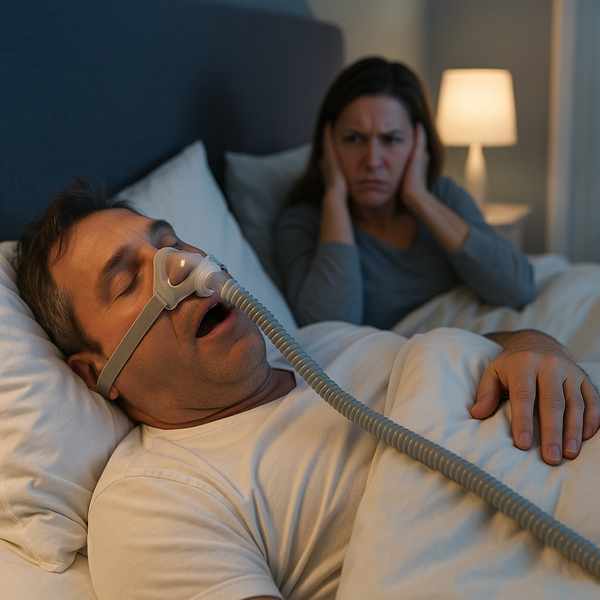
Understanding Obstructive Sleep Apnea
![]()
Obstructive sleep apnea is the most common form of sleep apnea. It happens when muscles in the upper airway relax too much during sleep. This blocks air from flowing smoothly.
- Loud snoring
- Gasping for air during sleep
- Dry mouth in the morning
- Morning headaches
- Difficulty staying asleep
These symptoms can affect anyone, but certain factors increase the risk. Men are more likely to have it than women. However, women’s risk goes up after menopause.
Excess weight is a major factor. Fat deposits around the neck can block the airway. This makes it harder to breathe while lying down.
Other factors include age, family history, and nasal congestion. Even people who are not overweight can have obstructive sleep apnea.
Treating obstructive sleep apnea is important. It improves quality of life and reduces health risks. But can weight loss cure sleep apnea? Let’s find out.
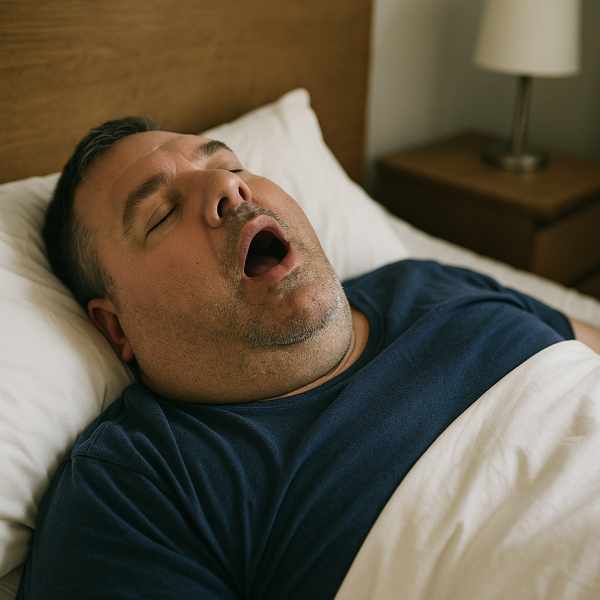
The Link Between Weight and Sleep Apnea
![]()
Excess weight is a known risk factor for obstructive sleep apnea. Studies show that weight gain can worsen sleep apnea symptoms. Losing weight might improve them.
- Fat around the neck narrows the airway.
- Extra weight increases pressure on the chest.
- Obesity raises the risk of breathing problems.
- Weight loss can reduce fat deposits.
- Shedding pounds might open the airway.
Many people ask, “Will sleep apnea go away if I lose weight?” The answer depends on several factors. Weight loss can help reduce symptoms in some cases.
In one study, participants lost 10-15% of their body weight. Their apnea-hypopnea index improved by about 30%. This suggests that losing weight can have a positive impact.
However, weight loss alone may not cure sleep apnea completely. Other treatments might still be necessary.
It’s important to approach weight loss as part of a comprehensive treatment plan. Consulting a healthcare provider is key to finding the right solution.
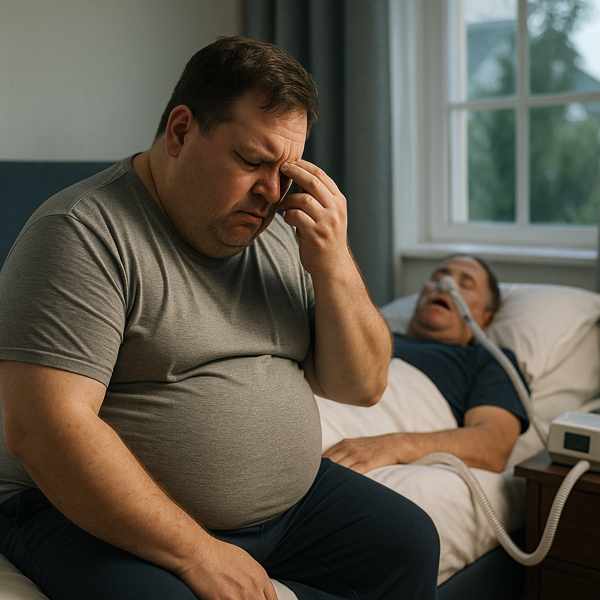
Benefits of Weight Loss for Sleep Apnea
![]()
Losing weight offers many benefits for people with sleep apnea. Shedding excess pounds can improve overall health and well-being.
- Reduces pressure on the airway
- Lowers blood pressure
- Decreases risk of heart disease
- Improves energy levels
- Enhances mood and mental clarity
Weight loss can also enhance the effectiveness of other treatments. For example, CPAP machines may work better when the airway is less obstructed.
Some studies show that modest weight loss can lead to significant improvements. Even a small reduction in body weight can make a big difference.
For those wondering how to lose weight with sleep apnea, starting with lifestyle changes is essential. A balanced diet and regular exercise are key components.
Support from healthcare professionals can also be helpful. They can provide guidance and monitor progress along the way.
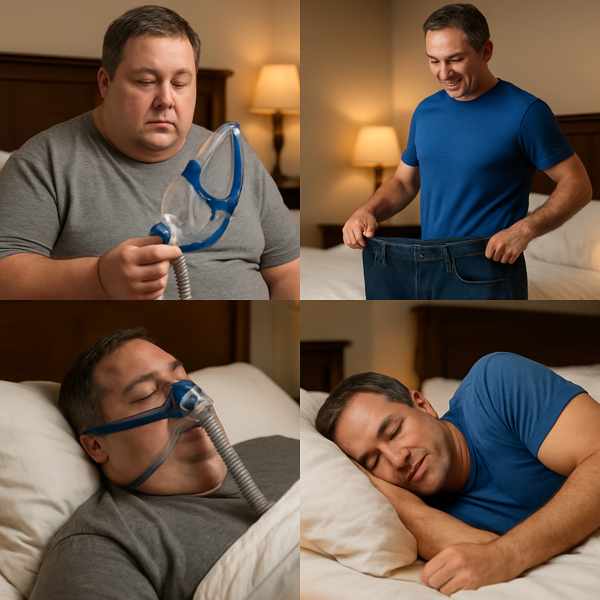
Challenges in Losing Weight with Sleep Apnea
![]()
While weight loss can benefit sleep apnea, it’s not always easy. People with sleep apnea may face unique challenges when trying to shed pounds.
- Daytime fatigue makes exercise difficult.
- Hormonal imbalances affect hunger signals.
- Poor sleep disrupts metabolism.
- Stress eating is common.
- Lack of motivation due to tiredness.
These challenges can make weight loss seem daunting. But they don’t have to stop progress. Understanding these obstacles is the first step in overcoming them.
Creating a realistic plan can help. Setting small, achievable goals is important. Gradual changes are often more sustainable than drastic ones.
Finding enjoyable activities can boost motivation. Whether it’s walking, swimming, or dancing, moving the body is beneficial.
Seeking support from friends, family, or support groups can also make a difference. Encouragement and accountability can be powerful motivators.
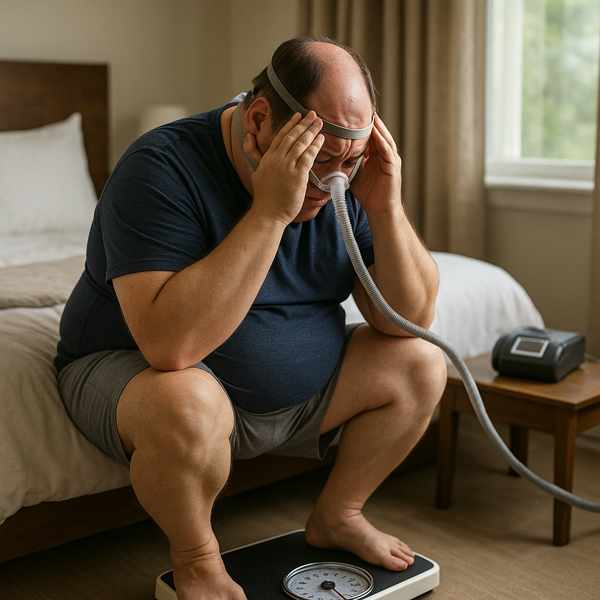
Combining Treatments for Better Results
![]()
For many people, a combination of treatments works best. While weight loss can help, other therapies might be needed for optimal results.
- CPAP machines keep the airway open.
- Oral appliances adjust jaw position.
- Surgery removes tissue blocking the airway.
- Weight-loss drugs may assist weight management.
- Behavioral therapy addresses lifestyle changes.
Each person’s situation is different. Doctors can recommend a personalized treatment plan based on individual needs.
Can treating sleep apnea cause weight loss? In some cases, yes. Improving sleep quality can lead to more energy for physical activity.
This creates a positive cycle. Better sleep supports weight loss, and weight loss improves sleep apnea symptoms.
Regular follow-ups with healthcare providers ensure the treatment plan is working effectively. Adjustments can be made as needed to achieve the best outcomes.
Conclusion: Can Weight Loss Cure Sleep Apnea?
![]()
So, can losing weight stop sleep apnea? While weight loss can significantly reduce symptoms, it may not cure sleep apnea entirely. It’s an important part of managing the condition, especially for those with excess weight.
Combining weight loss with other treatments often yields the best results. Continuous positive airway pressure (CPAP) machines, oral appliances, and lifestyle changes can all play a role in improving sleep quality.
The journey to better sleep requires patience and persistence. Working closely with healthcare providers ensures a tailored approach suited to individual needs.
Remember, each person’s experience with sleep apnea is unique. Exploring various treatment options can lead to a healthier, more restful life.
References
- Mitchell LJ, Davidson ZE, Bonham M, et al.
Weight loss from lifestyle interventions and severity of sleep apnoea: a systematic review and meta-analysis.
Sleep Medicine. 2014;15(10):1173–1183.
https://pubmed.ncbi.nlm.nih.gov/25192671/ - Carneiro-Barrera A, Amaro-Gahete FJ, Guillén-Riquelme A, et al.
Effect of an Interdisciplinary Weight Loss and Lifestyle Intervention on Obstructive Sleep Apnea Severity: The INTERAPNEA Randomized Clinical Trial.
JAMA Network Open. 2022;5(4):e228212.
https://jamanetwork.com/journals/jamanetworkopen/fullarticle/2791455 - Araghi MH, Chen YF, Jagielski A, et al.
Effectiveness of lifestyle interventions on obstructive sleep apnea (OSA): systematic review and meta-analysis.
Sleep. 2013;36(10):1553–1562.
https://academic.oup.com/sleep/article/36/10/1553/2416916 - Kuna ST, Reboussin DM, Borradaile KE, et al.
Long-Term Effect of Weight Loss on Obstructive Sleep Apnea Severity: Ten-Year Follow-up of the Sleep AHEAD Study.
American Journal of Respiratory and Critical Care Medicine. 2013;187(12):1298–1305.
https://www.atsjournals.org/doi/full/10.1164/rccm.201212-2145OC - Hudgel DW, Patel SR, Ahasic AM, et al.
The role of weight management in the treatment of adult obstructive sleep apnea: an official American Thoracic Society clinical practice guideline.
American Journal of Respiratory and Critical Care Medicine. 2018;198(6):e70–e87.
https://www.atsjournals.org/doi/full/10.1164/rccm.201807-1326ST